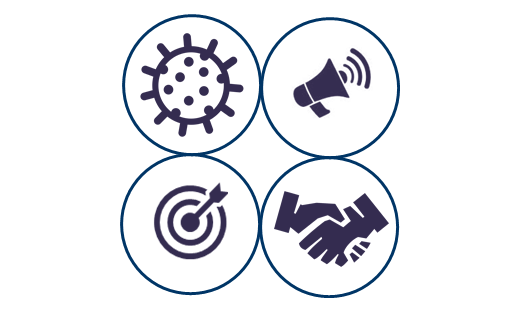ICBP Transition Phase

Contact the ICBP team
If you have any views or comments about the partnership, we would like to hear from you.
The ICBP Transition Phase (2021 to 2023) marked a period of reflection and renewal for the partnership. It focused on identifying future research priorities, strengthening international collaboration, and testing new approaches to data and knowledge sharing. As part of this phase, ICBP commissioned targeted research on the impact of COVID-19 and launched a series of thematic networks to explore key areas in cancer control. The following sections summarise these initiatives.
Transition phase COVID-19 research
In 2021, the ICBP commissioned two research projects to work collaboratively to provide evidence-based health policy insights to support mitigation strategies posed by COVID-19 and other future pandemics.
IARC, led by principal investigator Isabelle Soerjamataram, are assessing the incidence of breast, colon and rectal, ovarian and lung cancer before and during the COVID-19 pandemic, estimating indirect impacts by comparing observed to expected numbers. The team have also assessed the distribution of cases by stage at diagnosis before and during the COVID-19 pandemic.
The Daffodil Centre, led by principal investigator Karen Canfell, are using a mixed-methods study design to understand the impact of COVID-19 on cancer services and policies in ICBP jurisdictions through collating policies and practices implemented between 2020 – 2021 in response to COVID-19. The team have also reviewed and evaluated recovery strategies.
As this work progresses, look forward to updates here.
Transition phase networks
As part of its Transition Phase from 2021 to 2023, the International Cancer Benchmarking Partnership (ICBP) established a series of thematic networks designed to support emerging research priorities and strengthen collaboration across jurisdictions. These networks brought together clinicians, researchers, policymakers, and data experts to explore key areas in cancer control and service delivery. The following summaries outline the purpose, activities, and outcomes of each network.
Lung Network
The Lung Cancer Screening Network was established in 2021, to create an international peer network across ICBP countries to support activities to inform international cancer policy and practice. The network provided a forum for discussion and sharing of lessons learned in relation to implementation of lung cancer screening across the ICBP countries, targeted at service providers and policy decision-makers e.g., screening programme administrators/managers and department of health screening leads.
After successfully hosting two virtual events and meeting its initial objectives, the Lung Network has now concluded as the partnership shifts its focus to our Phase 3 programme. You can view a summary of the Lung Network’s work and achievements here:
Cancer Intelligence and Data Infrastructure (CIDI) Network
The CIDI Network was formed to explore how to build a resilient and sustainable infrastructure for international benchmarking. It convened experts from across ICBP jurisdictions to identify short-, medium-, and long-term improvements in cancer data and intelligence systems.
The first session introduced the network’s vision and featured insights from international benchmarking experts. Discussions focused on data access models (e.g. data-to-code, data-to-pool, code-to-data), challenges in federated analysis, anonymisation, and data linkage. Attendees shared experiences from COVID-19 and discussed how to better align cancer data priorities across jurisdictions.
Inequalities Network
The Inequalities Network was launched during the ICBP Transition Phase (2021–2023) to bring together experts in health equity. It aimed to explore the feasibility of using demographic data in international cancer comparisons and to understand how jurisdictions were addressing inequalities in cancer care.
Activities included a virtual event and a data landscape survey. Key themes included variation in data definitions (e.g. socioeconomic status), data sources and linkage capabilities, and strategies to address inequalities. The network highlighted the importance of consistent data practices and informed the development of Phase 3 research, which will include benchmarking studies and exploratory research on patient pathways, treatment, models of care, and workforce.
Inequalities Network Summary Document
Oesophageal and Gastric Cancer Network
The Oesophageal and Gastric Cancer Network was convened during the ICBP Transition Phase to explore site-specific challenges and opportunities in benchmarking and improving outcomes for these cancers. The network brought together clinical experts, researchers, and policy stakeholders to discuss the unique complexities of oesophageal and gastric cancer care across jurisdictions.
An initial event was held to identify priority areas for international collaboration. Discussions focused on variations in diagnosis and treatment pathways, data availability, and the potential for future benchmarking studies. Participants shared insights on clinical practice differences, implementation challenges, and opportunities for improving early detection and care coordination.
The event laid the groundwork for future research and collaboration, highlighting the importance of harmonised data and shared learning to address disparities in outcomes for these cancer types.
Join us on social media
Join the conversation and follow the ICBP on LinkedIn, X (formerly Twitter) and YouTube to stay informed on the latest updates from the partnership.
